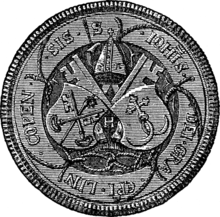Hans Brask

Hans Brask (1464–1538), bishop of Linköping, Sweden.[1]
Biography
Brask was born in Linköping 1464 to a bourgeois family. He studied philosophy and law at German universities, e.g. Rostock,[2] and around 1500 he received a doctoral degree in civil and canon law from Rome. Upon his return to Sweden he first worked as canon and was later, in 1505, appointed cathedral dean in the cathedral of Linköping. He also became a member of the council of the realm (Privy Council of Sweden) and worked for a reconciliation with Denmark, with which Sweden has been at war for some years. In 1513 he was appointed bishop in Linköping. Brask was opposed to Sten Sture's struggle with archbishop Gustav Trolle, but signed a document at the 1517 diet to remove the bishop. According to Olaus Petri's Swedish chronicles, Brask was forced to sign the document. Under his seal he is supposed to have put a note saying "Härtill är jag nödd och tvungen - "To this I am forced and compelled". This legend is the origin of a word in modern Swedish: brasklapp (brask note), meaning a hidden reservation.[3]
Brask supported the Danish king Kristian II, but was not part of the events that led to the infamous massacre in Stockholm 1520. After Gustav Vasa's rebellion he was forced to join the new king's side, but he would become an opponent of the king's politics. The events of 1527 diet in Västerås led to Brask fleeing the country to Poland.
Brask was an active man with many ideas. He had a was the first man to plan the channel between the two large Swedish lakes, Vänern and Vättern. He was running a printing house in Söderköping. The correspondence between Brask and others is an important source of history in a country where not much was written down.
Bishop Brask is believed to have died in Ląd monastery (the Cistercian Trail, Poland) in 1538, where his tombstone is seen to this day.
References
- ↑ d'Aubigné, Jean Henri Merle (1880). History of the Reformation in Europe in the Time of Calvin.
Bishop Brask of Linkoping was a priest endowed with immense energy. The outcries of the monks at Orebro were heard as far as Upsala; and in July, 1523, Brask received from the chapter of this metropolitan town a letter in which he was informed that the Lutheran heresy was boldly preached in the cathedral of Strengnaes by one Olaf Petri. It appears that this information was absolutely new to the vehement bishop. Completely devoted to the Roman Church, not even imagining that there could be any other, he was greatly agitated. He heard shortly after that emissaries of the Lutheran propaganda had made their appearance in his own diocese. He looked on this as the beginning of a great conflagration which would consume the whole Church.
- ↑ See entry of Hans Brask in the Rostock Matrikelportal
- ↑ Nordisk familjebok (in Swedish). 1878.
Brask, Hans, biskop, f. 1464 i Linköping af borgerliga föräldrar, idkade studier vid Greifswalds och andra utländska högskolor samt blef vid någon af dem doktor. Efter sin hemkomst anställdes han som kanik i Linköpings kapitel, blef 1505 domprost, intogs såsom sådan i rikets råd och blef 1513 biskop i Linköping. Han var en af sin tids främste män, kunnig och erfaren, såväl i ekonomiska och politiska som i kyrkliga ting, och derjämte en varm vän af allt, som han ansåg kunna främja sitt lands utveckling.
English translation: Brask, Hans, bishop, born 1464 in Linköping by burgess parents, practiced studies at Greifswalds and other foreign high schools, and was at one of them promoted doctor. After his return he was employed as a canon in the Chapter of Linköping, in 1505 he was elected vicar forane, as such was elected to the royal council, and in 1513 was elected bishop in Linköping. He was, at the time, one of the most prominent men, knowledgeable and experienced, in economical as well as political matters, and besides a warm friend of everything that could be expected to promote his lands development.
| Preceded by Hemming Gadh |
Bishop of Linköping 1513–1527 |
Succeeded by Jöns Månsson |
|